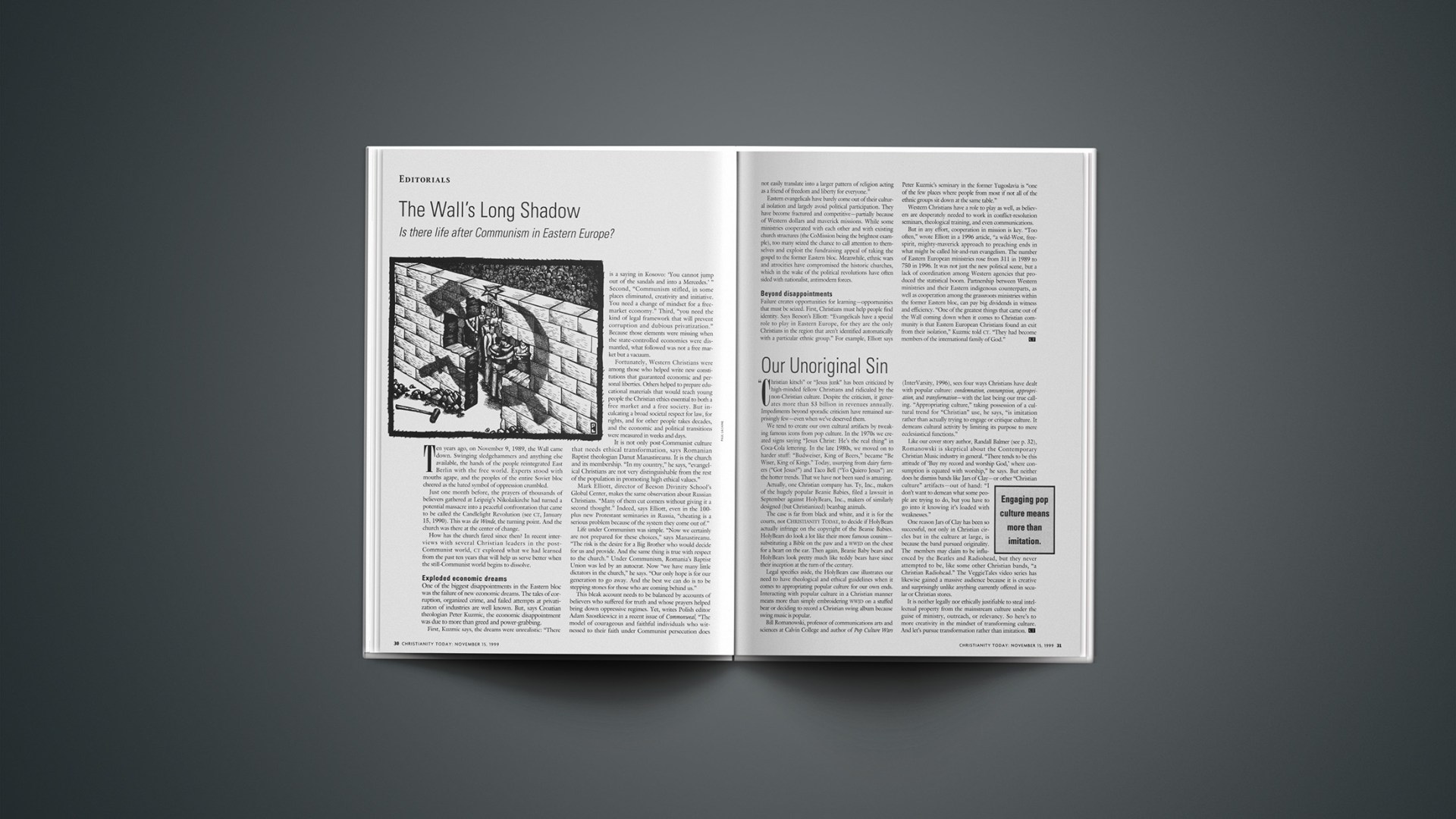Ten years ago, on November 9, 1989, the Wall came down. Swinging sledgehammers and anything else avail able, the hands of the people reintegrated East Berlin with the free world. Experts stood with mouths agape, and the peoples of the entire Soviet bloc cheered as the hated symbol of oppression crumbled.
Just one month before, the prayers of thousands of believers gathered at Leipzig’s Nikolaikirche had turned a potential massacre into a peaceful confrontation that came to be called the Candlelight Revolution (see CT, January 15, 1990). This was die Wende, the turning point. And the church was there at the center of change.
How has the church fared since then? In recent interviews with several Christian leaders in the post-Communist world, CT explored what we had learned from the past ten years that will help us serve better when the still-Communist world begins to dissolve.
Exploded economic dreams One of the biggest disappointments in the Eastern bloc was the failure of new economic dreams. The tales of corruption, organized crime, and failed attempts at privatization of industries are well known. But, says Croatian theologian Peter Kuzmic, the economic disappointment was due to more than greed and power-grabbing.
First, Kuzmic says, the dreams were unrealistic: “There is a saying in Kosovo: ‘You cannot jump out of the sandals and into a Mercedes.’ ” Second, “Communism stifled, in some places eliminated, creativity and initiative. You need a change of mindset for a free-market economy.” Third, “you need the kind of legal framework that will prevent corruption and dubious privatization.” Because those elements were missing when the state-controlled economies were dismantled, what followed was not a free market but a vacuum.
Fortunately, Western Christians were among those who helped write new constitutions that guaranteed economic and personal liberties. Others helped to prepare educational materials that would teach young people the Christian ethics essential to both a free market and a free society. But inculcating a broad societal respect for law, for rights, and for other people takes decades, and the economic and political transitions were measured in weeks and days.
It is not only post-Communist culture that needs ethical transformation, says Romanian Baptist theologian Danut Manastireanu. It is the church and its membership. “In my country,” he says, “evangelical Christians are not very distinguishable from the rest of the population in promoting high ethical values.”
Mark Elliott, director of Beeson Divinity School’s Global Center, makes the same observation about Russian Christians. “Many of them cut corners without giving it a second thought.” Indeed, says Elliott, even in the 100-plus new Protestant seminaries in Russia, “cheating is a serious problem because of the system they come out of.”
Life under Communism was simple. “Now we certainly are not prepared for these choices,” says Manastireanu. “The risk is the desire for a Big Brother who would decide for us and provide. And the same thing is true with respect to the church.” Under Communism, Romania’s Baptist Union was led by an autocrat. Now “we have many little dictators in the church,” he says. “Our only hope is for our generation to go away. And the best we can do is to be stepping stones for those who are coming behind us.”
This bleak account needs to be balanced by accounts of believers who suffered for truth and whose prayers helped bring down oppressive regimes. Yet, writes Polish editor Adam Szostkiewicz in a recent issue of Commonweal, “The model of courageous and faithful individuals who witnessed to their faith under Communist persecution does not easily translate into a larger pattern of religion acting as a friend of freedom and liberty for everyone.”
Eastern evangelicals have barely come out of their cultural isolation and largely avoid political participation. They have become fractured and competitive—partially because of Western dollars and maverick missions. While some ministries cooperated with each other and with existing church structures (the CoMission being the brightest example), too many seized the chance to call attention to themselves and exploit the fundraising appeal of taking the gospel to the former Eastern bloc. Mean while, ethnic wars and atrocities have compromised the historic churches, which in the wake of the political revolutions have often sided with nationalist, antimodern forces.
Beyond disappointments Failure creates opportunities for learning—opportunities that must be seized. First, Christians must help people find identity. Says Beeson’s Elliott: “Evangelicals have a special role to play in Eastern Europe, for they are the only Christians in the region that aren’t identified automatically with a particular ethnic group.” For example, Elliott says Peter Kuzmic’s seminary in the former Yugoslavia is “one of the few places where people from most if not all of the ethnic groups sit down at the same table.”
Western Christians have a role to play as well, as believers are desperately needed to work in conflict-resolution seminars, theological training, and even communications.
But in any effort, cooperation in mission is key. “Too often,” wrote Elliott in a 1996 article, “a wild-West, free-spirit, mighty-maverick approach to preaching ends in what might be called hit-and-run evangelism. The number of Eastern European ministries rose from 311 in 1989 to 750 in 1996. It was not just the new political scene, but a lack of coordination among Western agencies that produced the statistical boom. Partnership between Western ministries and their Eastern indigenous counterparts, as well as cooperation among the grassroots ministries within the former Eastern bloc, can pay big dividends in witness and efficiency. “One of the greatest things that came out of the Wall coming down when it comes to Christian community is that Eastern European Christians found an exit from their isolation,” Kuzmic told CT. “They had become members of the international family of God.”
Copyright © 1999 Christianity Today. Click for reprint information.










